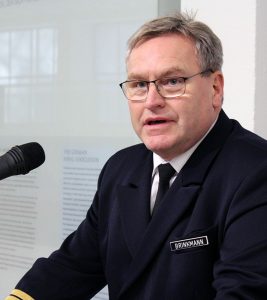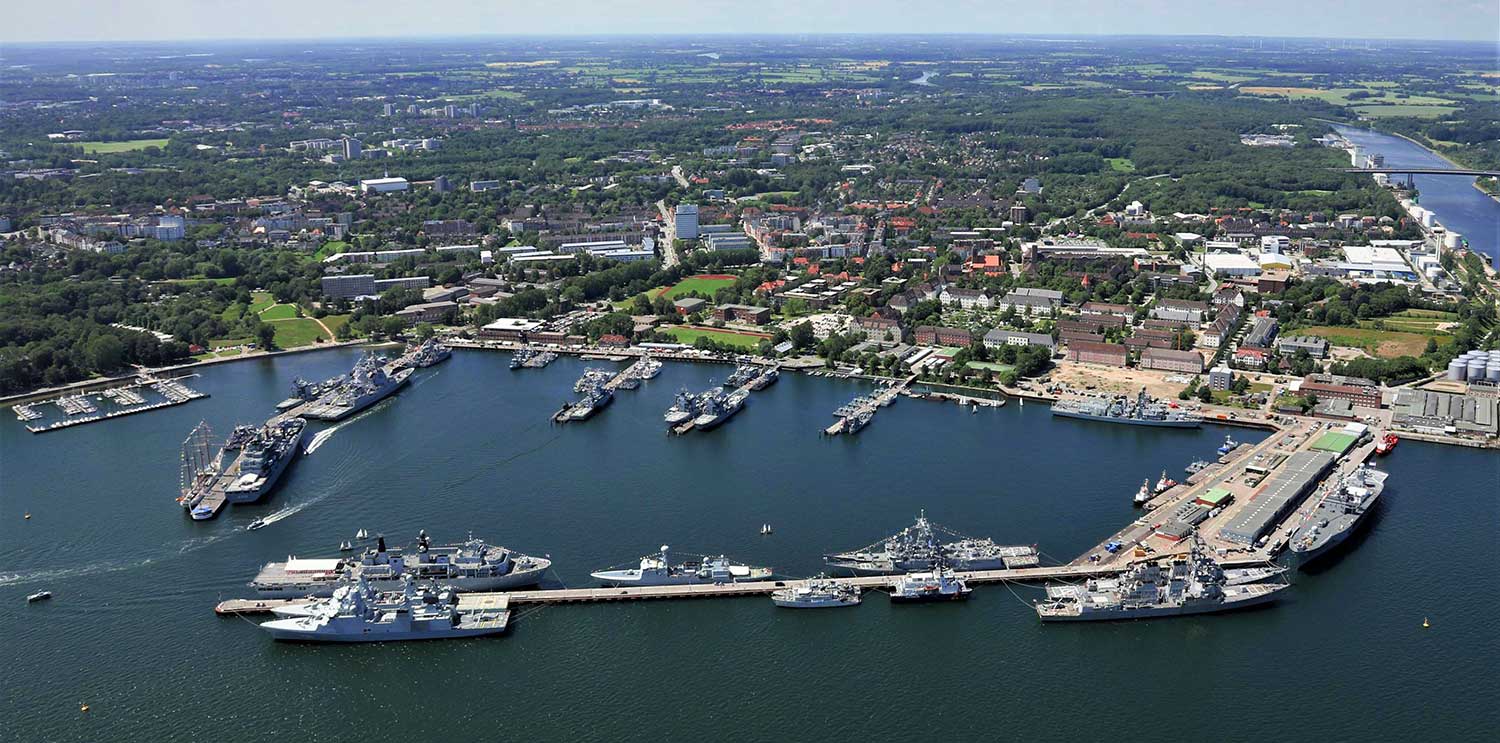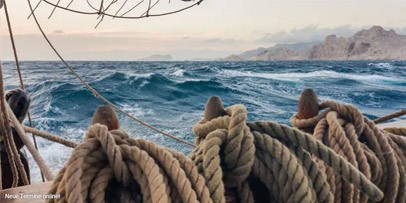Naming of barracks and naming in the navy ...
The incidents in the Bundeswehr, which are still associated with Pfullendorf, Illkirch, the KSK and right-wing extremists, led to the "Franco A. case" in 2017 and the 2018 Traditions Decree (https://www.bmvg.de/de/aktuelles/der-neue-traditionserlass-23232).

Under her leadership, the Tradition Decree was created in 2018: Defence Minister von der Leyen; Photo:bundeswehr
The associated order to the troops could not fulfil the Marine - although thankfully not directly affected to date. An inspection order was issued by the inspector. In March 2021, allegations emerged that the navy had decided to Naming in their Locations especially when it comes to historically "questionable" personalities. This was incorrect, and Vice Admiral Rainer Brinkmann, Deputy Inspector General of the Navy and Commander of the Fleet and Support Forces, therefore felt compelled to make a correction (see marine forum Issue 4-20, page 50). In his own polite and amusingly mocking style, he made it clear what he thought of the furore: "One senses betrayal, one senses scandal, one senses the chance to settle accounts with the navy and its leadership! Names that for some reflect splendour and glory, for others blindness and aberration, should be consigned to the dustbin of history: Tirpitz, Scheer, Graf Spee, Hipper, Coronel, Skagerrak, Marienburg ... Wollin, Königsberg, Elbing ...!"

Vice Admiral Rainer Brinkmann Photo: reunion-marine
He said what was right: nothing! The decision had not yet been made. Only a review of the naming at the naval bases had been carried out by the responsible department heads and commanders. The intention was to come to an appropriate decision in accordance with the tradition decree, with staff representatives and local authorities. They wanted to take their time, because "patience and composure are needed, not talk and nagging!" Until then, says Brinkmann: "The sailors' adage may apply: Keep calm!"
April 2021: Navy cancels the name Tirpitz!
The German Navy base in Kielthe Tirpitzhafen, will be renamed and the site will officially only be called Naval base Kiel-Wik will be called. Other loaded names are also to be replaced. For example, the Scheermole will become the Oskar Kusch Mole. The Tirpitzmole also loses its name and is to be named after the poet Gorch Fock (actually Johann Wilhelm Kinau) in future. The renaming goes back to the above-mentioned instruction from the Inspector of the Navy to review all existing names of barracks and infrastructure elements for their worthiness of tradition in the sense of the Tradition Decree and, where necessary, to arrange for a renaming. The Tradition Decree published in 2018 stipulates that the entire Bundeswehr's understanding of tradition should be based on its own history of over sixty years and its resistance to dictatorships and tyranny. Thus the realisation of what was started the year before.
Why Oskar Kusch?

The book that made Oskar Kusch famous Photo: Walle
The renaming of the Scheermole is intended to honour First Lieutenant Oskar Kusch, a submarine commander during the Second World War, who attracted attention in the navy because of statements critical of the regime and was executed on the firing range in Kiel-Holtenau in 1944. Oskar Kusch has already been honoured several times in and around Kiel. But how did this name come into the public consciousness in the first place? A story that has almost never been told:
The naval historian Dr Heinrich Walle came across the name by "literary chance" around 1990 and began his research. With the support of the German Naval Institute (today: German Maritime Institute, DMI, the owner of this website), the then Military History Research Office (MGFA) and the Inspector of the Navy, Vice Admiral Hein-Peter Weyher, Walle was able to publish the biography "Die Tragödie des Oberleutnants zur See Oskar Kusch" in 1995. The editors were the naval historian FKpt d.R. Prof. Dr Salewski and Flotilla Admiral Christian Giermann. The volume was presented in the Kiel parliament. Oskar Kusch was officially rehabilitated by the Attorney General of Schleswig-Holstein on the basis of these investigations. Oskar Kusch was not a resistance fighter who could be categorised as part of the attempted coup d'état of 20 July. But he was an opponent of the Nazi regime and stood by his opinion. He thus symbolises many who acted and spoke in a similar way, but who were either lucky enough not to be denounced or whose fate may still be unknown today.
Without the German Maritime Institute, the support from the then Naval Command Staff at the Federal Ministry of Defence and the work of Dr Heinrich Walle, the name Oskar Kusch might have remained undiscovered.
Opinions and letters to the editor
(Kieler Nachrichten) Navy breaks with its own tradition.
The renaming of the Kiel naval base (KN of 22 April 2021) is widely seen as an overdue departure from the older tradition. Tirpitz becomes Gorch Fock, Scheer becomes Oskar Kusch. The new namesakes are respectable personalities who lost their lives in the First and Second World Wars. They are undoubtedly worthy of tradition for new names in the naval sector. But do we have to throw the baby out with the bathwater? You can also turn the tables. For more than 60 years, an estimated 100,000 men and women - including the author of these lines - have dutifully served on their ships at the Tirpitz or Scheermole without taking offence at the names. Like all military leaders, these namesakes may be controversial with their successes and failures. They were "children of their time", just like our grandparents. They did not have today's knowledge of the course of the world. Here it is true that people err, but history is judgemental. We can and should rub our noses in the namesakes, learn from their behaviour and explain it to future generations. But you can't whitewash history, let alone the present and today's society, by cancelling names. Be that as it may, Tirpitz and Scheer have been part of the tradition and culture of remembrance of the post-war navy since 1956. So how is it that in April 2021, in the middle of a crisis-ridden world, the renaming suddenly became so urgent and was welcomed as a great modernisation effect? Apparently, the Germans are unable to deal with their history calmly. Those who marry themselves to the zeitgeist may soon be widowed. Uwe Jenisch, Kiel
(Kieler Nachrichten 03.05.21 ) Nince you have published two letters to the editor rejecting the new name for the naval base, I feel compelled to write a letter to the editor as a supporter of the new name: Of course, maintaining tradition and renewal have a lot to do with each other. Role models and traditional standards always need to be scrutinised. The Scheermole and Tirpitzmole were named during the "Third Reich". Why the role models of that time (and also some from the early days of the Bundeswehr) can no longer apply to us today (hopefully) needs no explanation. The "Oskar Kusch Pole" can make it clear: This man was executed solely because of his civil courage in communicating the truth about the Nazi regime of injustice to his occupying forces; this did not even require a crime-orientated resistance. Today, there is no death penalty for civil courage - but it is also required of soldiers, both on and off duty! "Gorch-Fock-Mole" probably stands more for the sail training ship than for the writer, who was proudly nationalistic, but by no means overly nationalistic. Don't be fooled: his short novel "The fastest ship in the fleet" was about the fastest fishing vessel in the Finkenwerder fleet! Dr Dieter Hartwig, FKpt (retired)
Dear Dr Hartwig, I was grateful to receive your reply to Dr Jenisch's letter to the editor as cross-information. The argumentation is conclusive on both sides, although I only vote in favour of renaming "children of a time" in exceptional cases (e.g. Petersstraße), but not in the case in question. I would have preferred a prominent place for the exemplary and vigilant Oskar Kusch in a maritime renaming. The current juxtaposition of names is also un-Hegelian, because the thesis-antithesis does not fit here, so there is no recognisable progression to the higher. I recommend a parallel look at the renaming debate in Rostock: Initiative for a new name instead of Ilja-Ehrenburg-Straße! R. Wiechert, Altenholz
Seamen's Sunday in Wilhelmshaven
The German Naval Museum Wilhelmshaven offered its traditional Seamen's Sunday on this topic on 6 May. Although digital due to the pandemic, it was nevertheless attractive. The topic aroused great interest. Without being able to list them all, a large number of mostly retired "naval celebrities" as well as men and women from the industry were attracted. This made the technical moderation a challenge and not all opinions could be heard. The aforementioned Vice Admiral Rainer Brinkmann was logged in as an official guest, who once again explained the reasons for the decisions. For him, a value-based approach applied, and a distinction had to be made between memorability and traditional value. He emphasised once again that the renaming had been preceded by an extensive vote.
Dear visitors of marineforum.online,
What is heritage, what is tradition? After the decision in Kiel, however, this is not "therapeutic debate". What will follow? So far, it has almost exclusively been senior citizens with a marine background who have spoken out. What do younger people think, what do citizens think? Go ahead, the comments section is open. And don't spoil my fun: remember the netiquette.
Holger Schlüter, Editor-in-Chief












The above-mentioned introduction to the topic and the official Bw justification make it clear to me that the discussed renaming of the piers at the Kiel naval base is a decision along the "main stream" or also the "spirit of the times". You just have to follow the line shown: KSK - Pfullendorf - Illkirch - Franco A case - then the review of the Bw's properties on the instructions of the Minister and lo and behold.... suddenly Tirpitz and Scheer as namesakes are on the supposedly same line of the breeding ground of right-wing and anti-constitutional activities in the Bundeswehr? I don't want to judge this decision unfavourably at all, one should just have the guts to call this occasion by its name and not construct an "urgent need" of the troops on the ground, whose joy of service depends on whether they throw the lead line from the bollard on the "Gorch-Fock-Mole" or from the bollard on the Tirpitzmole.
Incidentally, local opinion-makers had already renamed the Hindenburgufer access road to the naval base the Kiellinie, so it was only a matter of time before the next "bastion" was targeted.
In today's highly charged situation, the naval leadership has no other option but to give in to this zeitgeist if it does not want to be swept up in a storm of petitions and publicly controlled discussions that it probably still remembers well from other events. And at a time when there are truly more important decisions for the navy.
In this respect, I support VAdm Brinkmann's statement that this required decision should be made "with patience and composure" and not with nagging, and I also agree with Prof Jenisch's comments, who wonders why there should be such an urgent need for a name change in the crisis-ridden situation of 2021.
It also becomes difficult when the previous namesakes are subjected to an "ex post consideration / evaluation" procedure - which is at least not uncritical in the historical sciences - i.e. their work and actions in their time and the resulting justification for the honourable naming of two piers are measured against the principles of today's liberal democratic basic order. There is no doubt that a Gorch Fock or Oskar Kusch certainly come off better from today's perspective when compared directly with Tirpitz and Scheer. But their names only came into play after their predecessors had been knocked off their pedestals.
But back to the serenity that seems truly necessary. The new names should at least include a reference to the old designations and thus enable all those who now oppose them to remember the events that took place on these piers in the 65 years of our navy's post-war history.
As a follow-up to Andreas Uhl's reference to Wilhelmshaven: Fortunately, the naval leadership of the early 1960s was particularly far-sighted in labelling the main berths at the Wilhelmshaven naval base with the uncritical names "West and East Pier"! But let's wait and see, here too the "wind of change" for the entire property has not yet died down!
The German Naval Museum would like to incorporate the old signs into its archive as testimonies to the times, which will allow later visitors to experience the events and discussions surrounding the new version of the Tradition Decree.
In this context, I would like to draw your attention to an interesting live broadcast by the "Nautischer Verein zu Kiel" on 26 May 2021 at 6.00 pm. You can find more information here:
https://nautischer-verein-kiel.de/de/terminkalender.html
Gerald Immens
I've been in the navy for almost 37 years, but I've always talked about "the Wik", never said "Tirpitzhafen". When I travelled on Mölders, it was either at the "outer pier" or the "tobacco shed". Mind you, this was not done on purpose or even out of "political correctness" (is there actually a German translation for this?), it always felt like "maritime slang". Unlike in Flensburg, by the way, where we were actually moored at the "Blücherbrücke". Until last year, there was an annual "Blücherbrücke meeting point" here. By no means did we want to honour the hero of the wars of liberation in Europe, but rather our own (very democratic) past in the 1st Minesweeper Squadron.
In my opinion, the issue of "naming" only became virulent after a change of government in 1998, when doubts suddenly arose about the convictions of General Field Marshal Rommel - much to the protest of his British opponents at the time, who felt dishonoured by their own suffering, as they had now no longer lost their battles against the brave hero and "desert fox", but against an avowed Nazi criminal. As a result, we initially decommissioned the younger and more modern of the three destroyers - hopefully primarily for economic and technical reasons.
I am currently experiencing here in the USA how deep the division between North and South still is, even 165 years after the Civil War. While the rebel flag used to be a (ridiculed) expression of a certain "Southern Identity" (it speaks Bavarian!) and way of life ("redneck"), it now stands for revanchism, racism and "hateress" (roughly "hate culture"). General Lee is no longer a brave war hero and shrewd strategist, he is now a symbol of racism and division. The statues of Lee, Jackson and their ilk standing in central squares in every city in the South have either already been removed, covered in graffiti or hidden in wooden boxes. Only a few "conservative forces" are fighting to preserve them in the courts.
History is alive! And evolves. And to preserve the historical memory of the Kaiser's admirals, we have the German Naval Museum in Wilhelmshaven. - Wait a minute: if the Kaiser's navy bans admirals from its bases, shouldn't it logically banish its largest base from the Kaiser's own city?
Rather as a small addition to the topic of Oskar Kusch my review of an English-language edition at the USNI :
U-Boat Commander Oskar Kusch. Anatomy of a Nazi-Era Betrayal and Judical Murder
Eric C. Rust, U.S. Naval Institute Press, 15 September 2020, 384 p., $ 45,00
25 years after Heinrich Walle's book "Die Tragödie des Oberleutnant zur See Oskar Kusch" (The Tragedy of Lieutenant Oskar Kusch), which caused a storm of indignation among former members of the navy, this book by Rust is published in the series "Studies in Naval History and Sea Power" by the USNI in Annapolis. His assessment of the events surrounding Kush in the Second World War and especially after the war is already clear from the title of the book. He repeatedly refers to Walle, who wrote a standard work on the events.
Rust, born in Lübeck, served in the German Navy and began his studies in Kiel in 1971. He completed his doctorate at the University of Texas in Austin and has held a chair in history at Baylor University in Waco, Texas, since 1984. His research focuses on German naval history and submarine warfare in particular.
In eight chapters, Rust describes Lorient as a German submarine base, Kusch's career as submarine commander, the career of the IWO of U-154, Abel, the later denouncer, the first and second enemy voyages of U-154, the denunciation of Kusch by Abel, the investigation and trial as well as Kusch's 106-day wait for his execution.
In chapter 9, Rust links the sketches in Kusch's diary about his imminent execution with the painting by Francisco de Goya - The Shooting of the Insurgents of 3 May 1814 - in the Prado in Madrid: a screaming indictment of violence. The chapter concludes with the execution on 12 May 1944.
In the following chapter, Rust takes up Walle's findings on the system of injustice during the Nazi era and the cover-up attempts by its lawyers after the end of the war and in the early years of the Federal Republic of Germany. This cover-up system continued to have an effect until the 1970s.
Rust concludes his reflections with reference to around 33,000 executions of soldiers during the Nazi era. More than Walle's affirmative answer to the question of belonging to a broader resistance movement, Rust is concerned with the question of what today's officer corps of the Bundeswehr can learn from the events surrounding Kusch.
As Walle's book is out of print and will not be reprinted, this book by Rust can only be warmly recommended. Kusch, a naval officer who was only legally rehabilitated at a late stage, has found his place in the Bundeswehr's understanding of tradition.
Heinz Dieter Jopp Barmstedt, September 2020
I welcome the renaming. It is the right thing to do and - bearing in mind the co-signature lines - it has come at the right time. In the past, the navy would probably have been accused of waving a flag in the wind. Later, the 1TP54 outcry would have been similar to that which can now be heard from certain circles. Incidentally, the impression cannot be avoided that the loudest voices in the debate are characterised by a certain seniority. This leads to the conclusion that, at best, the renaming is uncontroversial in active naval circles and therefore among the younger generations. In the worst case, however, it means that tradition is not discussed or practised there at all - and that these considerations presented here would therefore unfortunately be a detached elite discussion.
It is true that the naming after Tirpitz and Scheer had been relatively uncontroversial for decades. However, when entering the Kiel base, the prospect of going ashore/returning home, Kiel Week and camaraderie were probably more important than thinking about the name of the pier heads. The people of Kiel hardly took offence at the naming either; perhaps also because they feared a domino effect that would lead to a review of numerous street names in the state capital? I freely admit that I hardly ever came across the name, but for the simple reason that I never used it.
In my opinion, "lifelong learning" is not only allowed, but required. After all, no ship in the German Navy will ever go to sea as a "Rommel", "Lütjens" or "Mölders". It is not a question of wilfully erasing history. We have to take a critical look at it and can only use it to show how our society is changing. It is therefore to be welcomed that the German Naval Museum in Wilhelmshaven has applied for access to the signs on the Tirpitz and Scheermole. They are in good hands in the depot on the North Sea, but it would be more sensible and desirable to actively engage with them on site on the Kiel Fjord. Here, the self-proclaimed Sailing City Kiel would be challenged to overcome its peculiar alienation with its history and current role as a naval city. From a sign underneath the station sign in Kiel main station to a genuine maritime museum in which the navy is not just presented bashfully on the sidelines, to a maritime adventure trail that links the key points of maritime history from Holtenau to Laboe and brings them to life, to regular scientific events on naval history and society, there are many proposals in the drawer.
History and tradition is what we - the maritime community - make of it.
Since my LB to the KN has already been printed here, I can leave it at my appreciation (!!) for this MF initiative!
Dieter Hartwig